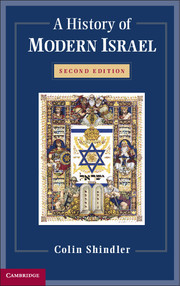Book contents
- Frontmatter
- Contents
- Illustrations
- Maps
- Acknowledgements
- Glossaries
- Chronology
- Preface to the second edition: Towards 2020
- Introduction
- 1 Zionism and security
- 2 The Hebrew Republic
- 3 New immigrants and first elections
- 4 The politics of piety
- 5 Retaliation or self-restraint
- 6 The Rise of The Right
- 7 The Road to Beirut
- 8 Dissent at Home and Abroad
- 9 An insurrection before a handshake
- 10 The end of ideology?
- 11 The Killing of a Prime Minister
- 12 The Magician and the Bulldozer
- 13 ‘He does not stop at the red light’
- 14 An unlikely grandfather
- 15 A Brotherly Conflict
- 16 Bialik's bequest?
- 17 Stagnation and Isolationism
- 18 An Arab Spring and an Israeli winter?
- Bibliography
- Index
- References
4 - The politics of piety
Published online by Cambridge University Press: 05 March 2013
- Frontmatter
- Contents
- Illustrations
- Maps
- Acknowledgements
- Glossaries
- Chronology
- Preface to the second edition: Towards 2020
- Introduction
- 1 Zionism and security
- 2 The Hebrew Republic
- 3 New immigrants and first elections
- 4 The politics of piety
- 5 Retaliation or self-restraint
- 6 The Rise of The Right
- 7 The Road to Beirut
- 8 Dissent at Home and Abroad
- 9 An insurrection before a handshake
- 10 The end of ideology?
- 11 The Killing of a Prime Minister
- 12 The Magician and the Bulldozer
- 13 ‘He does not stop at the red light’
- 14 An unlikely grandfather
- 15 A Brotherly Conflict
- 16 Bialik's bequest?
- 17 Stagnation and Isolationism
- 18 An Arab Spring and an Israeli winter?
- Bibliography
- Index
- References
Summary
The Balancing Act
Shortly before he died in 1973, Ben-Gurion confided that he had been wrong to grant religious courts the right to make decisions in matters of personal status. This and other issues relating to Jewish identity appeared with increasing frequency during the first decade of Israel's existence. Ongoing crises, resignations, the reshaping of coalitions and the downfall of governments came to characterize Israeli politics. The fragmentation of Jewish identity in the nineteenth century – an attempt to come to terms with post-Enlightenment modernity – had produced a plethora of variations. The Shoah and the establishment of the state, however, had caused the demise of numerous ideologies such as Bundism, yet other rivalries continued to thrive in Israel. Thus the devout secularists of Mapam and Mapai were as determined as the Council of Sages of Agudat Yisrael to stamp the future direction of the state with their imprimatur. The former believed that Zionism had revolutionized Jewish life and normalized the Jews. The latter wished to continue the tradition of eons and rebuild the spiritual walls of the past.
Although Ben-Gurion's aversion to Mapam created an alliance between Mapai and the non-Zionist and often anti-Zionist religious parties, there was a deep-seated desire to avoid a kulturkampf during the early years of state-building. In forming a government, Ben-Gurion's choice of coalition partners was between adherents of a political ideology and the worshippers of a faith. No doubt Ben-Gurion based his decision on the political realities of the time, but this alliance set the pattern for future coalitions. Mapam eventually drifted away from its infatuation with Stalin, split into two and dwindled in political influence, but the religious parties kept their faith and bolstered their political authority. Ben-Gurion well understood the dilemma that he was faced with. He was a member of that transitional generation that was moving from religion to secularism. Indeed, he preferred Rabbi Akiva who supported the Bar-Kochba revolt against the Romans over Yochanan Ben-Zakkai who was allowed to establish the yeshiva of Yavneh after the destruction of Jerusalem. He was therefore not unaware of the potential dangers which the religious bloc posed to stable government, particularly as it changed its stance of safeguarding the interests of the religious community to one of minimum levels of observance for the whole country.
- Type
- Chapter
- Information
- A History of Modern Israel , pp. 78 - 97Publisher: Cambridge University PressPrint publication year: 2013



